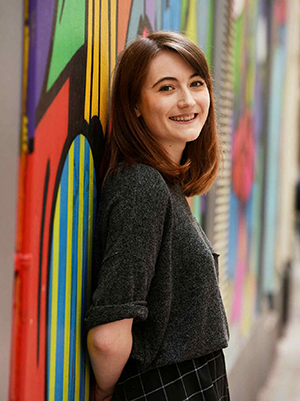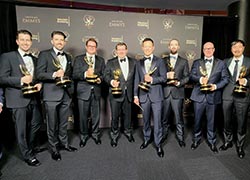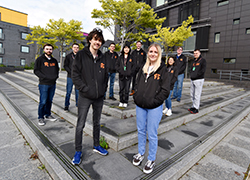Course overview
Foundation year Work placement
Animex 2024
Animex 2024 round-up, our international festival of animation, VFX and games.
The popularity of computer games shows no signs of slowing down with the regular release of new sophisticated and innovative products, and smartphone apps – many developed in the UK. As a computer games artist you create a game's characters, assets, environments, creatures and vehicles, as well as producing concept art and storyboards.
You develop your artistic skills and explore specialised areas including 3D character sculpting, photo-real texturing and surfaces, hard surface modelling, shaders, material, lighting and effects, game engine implementation, concept art, environment art and character art.
Top reasons to study computer games art at Teesside
- Number 1: Teesside University has been ranked the number 1 video game design and development school in the UK and number 5 in Europe. (GAMEducation 2025, tees.ac.uk/source).
- Industry links: take part in Animex, our annual international animation and games festival featuring experts from Rockstar, Pixar, Disney and Sony.
- Real-world experience: enter GameJam events, take part in industry competitions and Beta test upcoming games before they are released.
- Career-ready: our ExpoSeries of events allow you to showcase your skills to industry professionals who are seeking to recruit new and rising talent.
- Industry recognition: our course is recognised by ScreenSkills, the industry-led skills body for the UK's screen-based industries, and carries the ScreenSkills Select quality-mark which indicates courses best suited to prepare students for a career in the screen industries.
- Guidance and support: 100% of BA (Hons) Games Art students agreed that they have received sufficient support, advice and guidance in relation to their course (National Student Survey 2025, tees.ac.uk/source).
Course details
Course structure
Year 1 core modules
You are introduced to the fundamental principles used in the production of real-time 3D models and 2D texture assets.
This is a 30-credit module.
Environment Production for Games
You study the research, planning and authoring of environment asset content for games engine integration. Adopt industry techniques including architecture research, real-time terrain creation, modelling and texturing for environment assets, VFX and lighting for real-time content.
This is a 30-credit module.
You broaden your artistic and visual horizons, and develop your observational skills. You study contemporary and historical visual arts across games, cinema, fashion, graphic design, architecture, product design and typography.
This is a 30-credit module.
Focus on creating organically sculpted assets, characters and creatures that could be used within a game, TV or film environment. Learn core skills and sculpting techniques by getting an introductory knowledge of leading industry software.
This is a 30-credit module.
Year 2 core modules
You are introduced to industry workflows for authoring film and game-ready characters using industry-standard digital sculpting tools such as ZBrush. Study key points in the creation process, from sculpting accurate human anatomy and creating outfits and accessories, to retopology, UV mapping and texturing.
This is a 30-credit module.
Develop your understanding of custom asset pipelines in authoring games art to a real-time game level. You are introduced to technical art solutions, building on your skills to create engaging immersive environments which meet hardware budgets and rendering performance.
This is a 30-credit module.
You learn the fundamental principles involved in promoting real-time hard surface 3D models and 2D textures in a game environment.
This is a 30-credit module.
You work with students from across all the games courses to develop a game slice in a team. Experience working in a production environment, and focus on specific skills in your own field of study while gaining valuable teamwork skills.
This is a 30-credit module.
Optional work placement year
You have the option to spend one year in industry learning and developing your skills. We encourage and support you with applying for a placement, job hunting and networking.
You gain experience favoured by graduate recruiters and develop your technical skillset. You also obtain the transferable skills required in any professional environment, including communication, negotiation, teamwork, leadership, organisation, confidence, self-reliance, problem-solving, being able to work under pressure, and commercial awareness.
Many employers view a placement as a year-long interview, therefore placements are increasingly becoming an essential part of an organisation's pre-selection strategy in their graduate recruitment process. Benefits include:
· improved job prospects
· enhanced employment skills and improved career progression opportunities
· a higher starting salary than your full-time counterparts
· a better degree classification
· a richer CV
· a year's salary before completing your degree
· experience of workplace culture
· the opportunity to design and base your final-year project within a working environment.
If you are unable to secure a work placement with an employer, then you simply continue on a course without the work placement.
Final-year core modules
Experience working as a member of a games development team, in a setup that is as close to industrial practice as possible. You work in groups to construct a working game demo in a current game engine. You consider standard industry practices that consider multiplayer gaming threats, user safety, cheating and data security.
This is a 30-credit module.
You undertake a large-scale project guided by a member of staff, where you produce a substantial piece of work related to your course alongside a written report. You also present and discuss your project.
This is a 60-credit module.
You focus on the creation of high-quality, cost effective game assets using photogrammetry scan and procedural based workflows. Develop your skills in procedural material generation for complex shader workflows, 3D capture assets and the use of scan data when creating realistic game assets.
This is a 30-credit module.
Modules offered may vary.
How you learn
You learn in lectures and tutorials. Lectures cover the theory while tutorials focus on your practical skills. Further support is offered online in the form of extra learning material.
You also develop your teamworking skills, working with games designers in a simulated game studio experience, outsourcing various essentials such as assets and animation to specialist teams. You work on games in Unreal 5 in a scenario that is as close to industry practice as possible within an academic environment.
How you are assessed
You develop a portfolio of games art throughout the course and are assessed through practical projects. The final-year project allows you the freedom to set your own brief based on your skills, interests and career aspirations.
Our Disability Services team provide an inclusive and empowering learning environment and have specialist staff to support disabled students access any additional tailored resources needed. If you have a specific learning difficulty, mental health condition, autism, sensory impairment, chronic health condition or any other disability please contact a Disability Services as early as possible.
Find out more about our disability services
Find out more about financial support
Find out more about our course related costs
Entry requirements
Entry requirements
96-112 points points plus a portfolio if your Level 3 qualifications do not include a creative subject such as art, design, drawing, animation or games art/design. Your portfolio should demonstrate fundamental drawing skills, such as life drawing and observational drawing, alongside showing us your creativity. Get some hints and tips on how to prepare a portfolio
If you have gained credits at Level 4 or higher in a related subject from previous study at college or university then credit transfer towards your new course may be possible.
Find out how many points your qualifications are worth using the UCAS tariff calculator. If your qualifications are not listed, contact our admissions team as we may accept alternatives.
We may also be able to help you meet the entry requirements through our Summer and Winter University modules.
For general information please see our overview of entry requirements.
International applicants can find out what qualifications they need by visiting Your Country.
You can gain considerable knowledge from work, volunteering and life. Under recognition of prior learning (RPL) you may be awarded credit for this which can be credited towards the course you want to study.
Find out more about RPL
Employability
Career opportunities
Graduates have gone on to work as artists, level designers, 3D modellers and texture artists at a range of games companies including 3rd Dimensions, Atomic Planet, Bizarre Creations, Creative Assembly, Electronic Arts, Eutechnyx, Halch, Media Molecule, Microsoft Rare, Naughty Dog, Ninja Theory,Rebellion, Rockstar North and Rockstar San Diego, Sega, Sony, Streamline, Supermassive Games, Traveller's Tales, Ubisoft, Venom, Weta Digital and many more.
You also develop skills for a career in digital media – typically areas of film, TV, advertising and multimedia – through to architectural and product visualisation.
We have excellent relationships with many businesses, giving you the opportunity to apply for summer, year-long and graduate placements with key organisations such as Microsoft, Rare, Team 17, ZeroLight, R8 Games, Hammerhead VR, Dojo Arcade, Schlumberger, Sumo Digital and Coastsink.
Information for international applicants
Qualifications
International applicants - find out what qualifications you need by selecting your country below.
Select your country:
Useful information
Visit our international pages for useful information for non-UK students and applicants.


 Emmy success for Teesside University graduate
Emmy success for Teesside University graduate Indie games studios to attend prestigious conference
Indie games studios to attend prestigious conference Leading games studio helping students gain industry experience
Leading games studio helping students gain industry experience